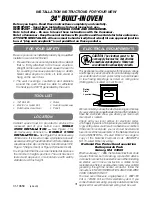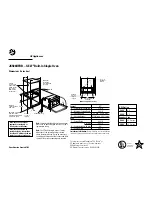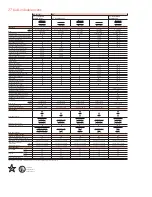
17
■
Shadows on the door panel which look like streaks, are
caused by reflections made by the oven light.
■
Enamel is baked on at very high temperatures. This can
cause some slight colour variations. This is normal and does
not affect their function. The edges of thin trays cannot be
completely enamelled. As a result, these edges can be
rough. This will not impair the anti-corrosion protection.
■
Unpleasant odours, e.g. after fish has been prepared, can be
removed very easily. Add a few drops of lemon juice to a cup
of water. Place a spoon into the container as well, to prevent
delayed boiling. Heat the water for 1 to 2 minutes at
maximum microwave power.
Cleaning agents
To ensure that the different surfaces are not damaged by using
the wrong cleaning agent, observe the information in the table.
Do not use
■
sharp or abrasive cleaning agents,
■
metal or glass scrapers to clean the glass in the appliance
door,
■
metal or glass scrapers to clean the door seal,
■
hard scouring pads and sponges,
■
cleaning agents with high concentrations of alcohol.
Wash new sponge cloths thoroughly before use.
Cleaning the glass panels
The glass panels can be removed from the oven door for
cleaning.
ã=
Risk of burns!
Do not remove the panels immediately after switching the
appliance off. The oven must be cold.
Removal
1.
Open the oven door.
2.
Undo the two screws on the door using a flat-bladed
screwdriver (blade width 8-11 mm). Hold the door panel
firmly while doing this. (Fig. A).
3.
Close the door slowly and pull out the panel upwards by the
door handle. (Fig. B)
4.
Hold the intermediate panel firmly and press the safety catch
on the door upwards. Lift out the panel upwards. (Fig. C).
Notes
■
Clean the glass panel with glass cleaner and a soft cloth.
■
Do not use any sharp or abrasive agents. The glass scraper
is not suitable.
Refitting
1.
Grip the upper section of the intermediate panel with both
hands and insert it into the guide at the bottom. (Fig. A).
Note:
Make sure that the panel is aligned evenly, at the
bottom.
2.
The lettering must be positioned in the top right corner, so
that it can be easily read. (Fig. B).
3.
Push the safety catches downwards. (Fig. C).
Area
Cleaning agents
Appliance front
Hot soapy water:
Clean with a dish cloth and dry with a
soft cloth. Do not use glass cleaners or
metal or glass scrapers for cleaning.
Stainless steel
Hot soapy water:
Clean with a dish cloth and dry with a
soft cloth. Remove flecks of limescale,
grease, starch and albumin (e.g. egg
white) immediately. Corrosion can form
under such residues. Special stainless
steel cleaning agents can be obtained
from the after-sales service or from spe-
cialist shops.
Oven
Hot soapy water or a vinegar solution:
Clean with a dish cloth and dry with a
soft cloth.
If oven is very dirty: use oven cleaner,
but only when oven is cold. It is best to
use a stainless-steel sponge.
Glass cover for the
oven light
Hot soapy water:
Clean with a dish cloth.
Control panel/outer
door panel
Glass cleaner:
Wipe dry immediately using a soft cloth.
Do not use a glass scraper.
Inner door glass
Glass cleaner:
Wipe dry with a soft cloth. Do not use a
glass scraper.
Seal
Hot soapy water:
Clean with a dish cloth, do not scour.
Do not use a metal or glass scraper for
cleaning.
Accessories
Hot soapy water:
Soak and clean with a dish cloth or a
brush.
$
%
&
$
%
&
Summary of Contents for HB86P.75B
Page 1: ......
Page 2: ......
Page 3: ......
Page 4: ......
Page 5: ......
Page 6: ......
Page 7: ......
Page 8: ......
Page 9: ......
Page 10: ......
Page 11: ......
Page 12: ......
Page 13: ......
Page 14: ......
Page 15: ......
Page 16: ......
Page 17: ......
Page 18: ......
Page 19: ......
Page 20: ......
Page 21: ......
Page 22: ......
Page 23: ......
Page 24: ......
Page 25: ......
Page 26: ......
Page 27: ......
Page 28: ......
Page 29: ......
Page 30: ......
Page 31: ......
Page 32: ......
Page 33: ......
Page 34: ......
Page 35: ......
Page 36: ......
Page 37: ......
Page 38: ......
Page 39: ......
Page 40: ......
















































